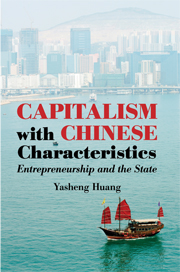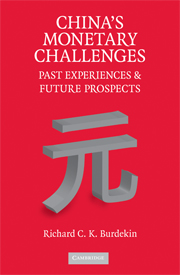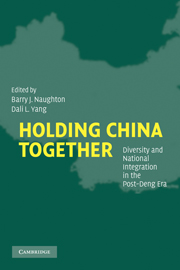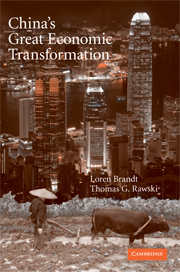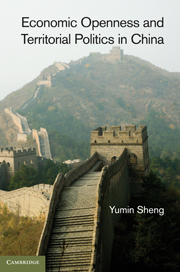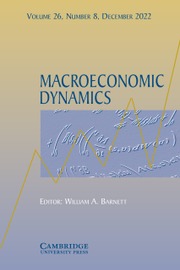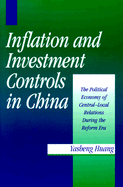Capitalism with Chinese Characteristics
Entrepreneurship and the State
- Author: Yasheng Huang, Massachusetts Institute of Technology
- Date Published: September 2008
- availability: Available
- format: Hardback
- isbn: 9780521898102
Hardback
Other available formats:
eBook
Looking for an inspection copy?
This title is not currently available for inspection. However, if you are interested in the title for your course we can consider offering an inspection copy. To register your interest please contact [email protected] providing details of the course you are teaching.
-
Presents a story of two Chinas – an entrepreneurial rural China and a state-controlled urban China. In the 1980s, rural China gained the upper hand. In the 1990s, urban China triumphed. In the 1990s, the Chinese state reversed many of its rural experiments, with long-lasting damage to the economy and society. A weak financial sector, income disparity, rising illiteracy, productivity slowdowns, and reduced personal income growth are the product of the capitalism with Chinese characteristics of the 1990s and beyond. While GDP grew quickly in both decades, the welfare implications of growth differed substantially. The book uses the emerging Indian miracle to debunk the widespread notion that democracy is automatically anti-growth. As the country marked its 30th anniversary of reforms in 2008, China faces some of its toughest economic challenges and substantial vulnerabilities that require fundamental institutional reforms.
Read more- In-depth examination of data and archival documents never previously examined by Western academics
- Proposes a very different interpretation of China's economic reforms from the conventional wisdom
- Focusing on a vitally important topic - private entrepreneurship - that has not received sufficient attention in studies of China's economy
Reviews & endorsements
'The development of the Chinese private sector is a key to the future shape and performance of the Chinese economy. At present, the subject is widely misunderstood. This book does more than any other to clarify the issues and point the way forward.' Christopher Howe, School of East Asian Studies, University of Sheffield
See more reviews'… important book … If one wants to understand the policy origins of China's growing divide between rich and poor, urban and rural, one need look no further than this book.' William Kirby, Harvard University
'Sure to generate a lively debate, Professor Huang's study provides a provocative and well-researched challenge to much current thinking on China's economic development.' Susan Rose-Ackerman, Yale Law School
'… Capitalism with Chinese Characteristics is both immensely informative and enormously provocative.' Charles Wolf, Jr, Pardee RAND Graduate School
'… the scale of the research is impressive, and goes beyond most western commentators other than those with high-level Chinese language skills and access to the primary sources. … the book is overall an important reminder that the story of China's growth rewards detailed research and is not simply the tale of a gradual deepening of market-led economic reform. … Huang's tale of the first two decades of China's economic reform is indeed worth bearing in mind when watching the latest developments.' The Business Economist
'… profoundly informative book …' The Spokesman
'This is among the most important books to appear on contemporary China this decade. Motivated by a socially conscious economic liberalism and guided by a firmly positivist epistemology, Yasheng Huang challenges - and defeats - some of the most sacred myths surrounding the Chinese political economy as reinforced by scholars and widely accepted by the general public. The book is essential reading for any political scientist specializing in China, international relations, comparative economic development, or comparative political change.' Perspectives on Politics
'[Marshals] an impressive array of survey and documentary evidence … a must-read for China specialists.' The Journal of Asian Studies
Customer reviews
Not yet reviewed
Be the first to review
Review was not posted due to profanity
×Product details
- Date Published: September 2008
- format: Hardback
- isbn: 9780521898102
- length: 366 pages
- dimensions: 238 x 160 x 25 mm
- weight: 0.63kg
- contains: 9 tables
- availability: Available
Table of Contents
1. Just how capitalist is China?
2. The entrepreneurial decade
3. A great reversal
4. What is wrong with Shanghai?
5. Capitalism with Chinese characteristics.
Sorry, this resource is locked
Please register or sign in to request access. If you are having problems accessing these resources please email [email protected]
Register Sign in» Proceed
You are now leaving the Cambridge University Press website. Your eBook purchase and download will be completed by our partner www.ebooks.com. Please see the permission section of the www.ebooks.com catalogue page for details of the print & copy limits on our eBooks.
Continue ×Are you sure you want to delete your account?
This cannot be undone.
Thank you for your feedback which will help us improve our service.
If you requested a response, we will make sure to get back to you shortly.
×
